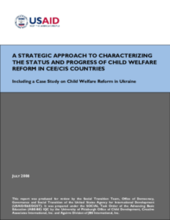The purpose of this report is to create a strategy for assessing the status and progress of child welfare reform in CEE/CIS countries using the best available quantitative and qualitative information. The assessment focuses on children without permanent parents who are in state care, which includes true orphans and social orphans. Traditionally in the region, such children were cared for by the state in several types of residential institutions. A major component of child welfare reform, however, includes providing family-care alternatives, which may incorporate non-relative foster care, guardianship/kinship care, small group home care, reunification with biological parents, and adoption.

